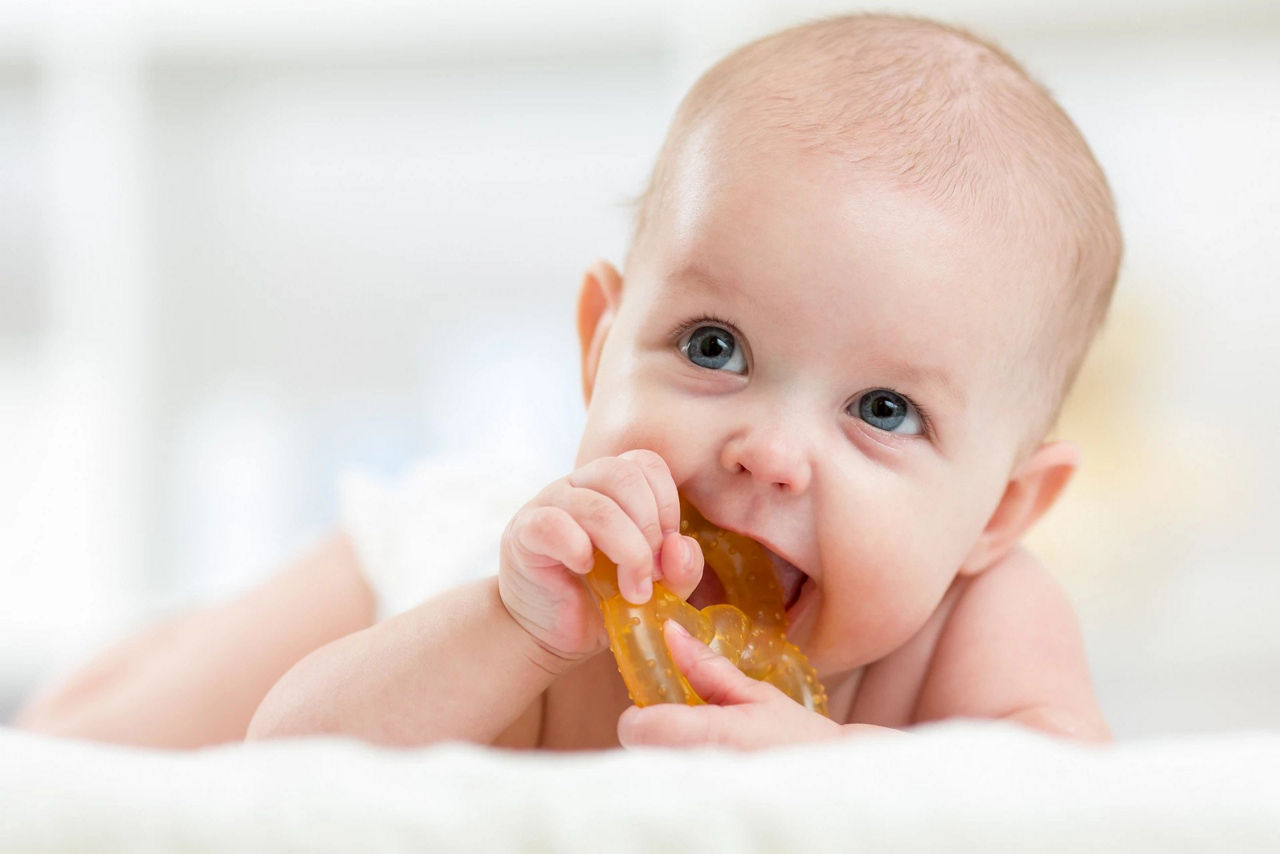Free weaning plan - Register here
Somewhere between 3 and 12 months, your baby’s teeth will make their grand and tortuous entrance.
When your baby’s first pearly whites start to poke through, you might be taken by surprise, or you might feel relieved after weeks of teething signs. Every baby’s teething experience will be different. Some have virtually no symptoms, while other little ones experience teething pain for months (torture for both baby and mum). Fortunately, there are some signs to watch for as this milestone approaches and some tips that can help make teething easier for your baby (and for you too!).
Baby-tooth timeline
Typically, babies get their teeth in pairs. Usually the first to appear are the middle two on the bottom (really cute ones). A month or so later, the two above those arrive. Still, it’s not uncommon to see a baby with four bottom and no upper teeth, or the reverse. All babies will be different but here is a general timeline:
- 6 months: bottom two, front and centre (lower central incisors)
- 8 months: Two front teeth (upper central incisors)
- 10 months: lower and upper lateral incisors
- 18 months: canines
- 24 months: second molars
Signs & Symptoms
Your little one won’t understand why they are in pain or why they keep waking up during the night with discomfort. Short of actually seeing a tooth poking through, and given that the process is different for every baby, here are some possible symptoms to watch for:
Drooling
It’s hard to believe so much fluid can come from your tiny human, but teething stimulates drooling, and the waterworks start for many babies from about 10 weeks to 3 or 4 months of age. If you find that your little one’s clothes are constantly wet, use a bib and make sure to gently wipe their chin throughout the day to reduce the risk of a rash (teething is bad enough).
Teething rash
Unfortunately a teething rash right under that cute little chin can occur due to the excess drooling mentioned above. It’s hard to avoid completely, just keep dry clothes and lots of bibs on hand.
Biting
Pressure from teeth poking through under the gums causes your baby a lot of discomfort, and that discomfort can be relieved by counter pressure (or biting). Teething babas will gum (bite, but without teeth) whatever they can get their hands on!
Crying
Some babies breeze through teething without so much as a whimper, while others suffer from a good deal of pain to which they feel compelled to share with you in the form of crying. First teeth usually hurt the most (as do the molars, because they’re just plain bigger), but the good news is most babies eventually get used to what teething feels like and aren’t as affected after the first few.
Grouchy
Your baby’s mouth will be in agony as that little tooth presses on the gums and pokes up to the surface, and, not surprisingly, it’ll probably make them feel out of sorts. Some babies may be irritable for just a few hours, but others can stay crabby and grumpy for days or even weeks. But hey, who can blame ‘em! Who doesn’t feel grouchy when they are in pain?
Change in feeds
Uncomfortable, cranky little ones long to be soothed by something in their mouths. But the motion of sucking may make a teething baby’s sore gums feel worse, so teething babies can sometimes be fussy about feeding.
Night waking
The teething fairy doesn’t only work days. As your baby’s teeth begin to emerge, their discomfort may disrupt their night-time sleep (even if they previously slept through the night). Before offering comfort, see if they can settle themselves back to sleep; if they are still restless, soothe them with rocking or lullabies but if possible, avoid a return to night-time feedings if they were past the stage of needing them.
Cheek rubbing & ear pulling
Teething babies may tug furiously at their ear or rub their cheek or chin. Gums, ears and cheeks all share nerve pathways, and so an ache in the gums can travel elsewhere.
The type and severity of these symptoms vary wildly from baby to baby — for one baby, teething means lots of discomfort and big-time tears, while another child might breeze right through to a mouth full of teeth without a complaint. Still, you can expect to see at least some, and maybe many, of these symptoms.
Hang in there!

Join the C&G baby club today
- Weekly emails with tips and advice for your stage
- 1-to-1 support from our dedicated Careline team, 8.30am - 5.30pm Monday to Friday.

Join the C&G baby club today
- Weekly emails with tips and advice for your stage
- 1-to-1 support from our dedicated Careline team, 8.30am - 5.30pm Monday to Friday.
More from baby
Baby topics
Any more questions?
Our specialist baby advisors and experienced mums are here to talk and ready to help whenever you need them. You can call us or reach us on Live Chat 8.30am-5.30pm Monday-Friday.
Phone
Call 1800 570 570
FAQs
For all the latest information
Email Us
Send us an email
8.30 am - 5.30pm Monday-Friday





